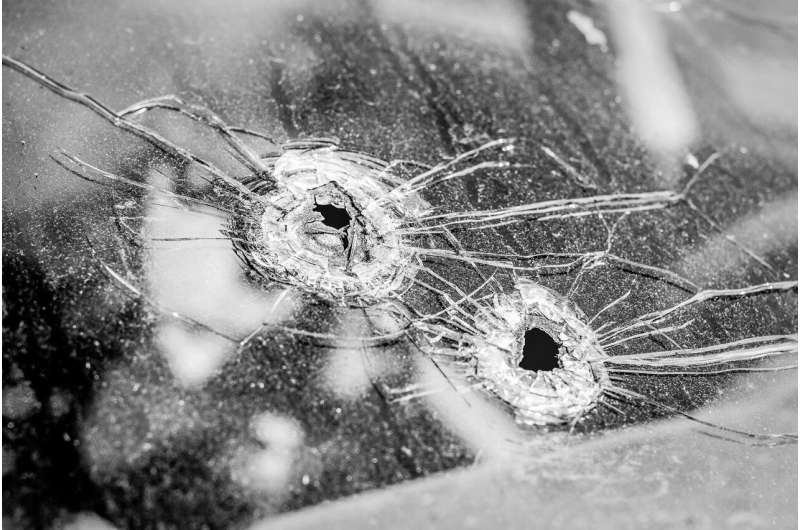This article has been reviewed according to Science X's editorial process and policies. Editors have highlighted the following attributes while ensuring the content's credibility:
fact-checked
peer-reviewed publication
trusted source
proofread
Chicago community violence intervention program shown to reduce gun violence

New research shows large reductions in gun violence involvement for participants of a Chicago-based community violence intervention (CVI) program.
Researchers from Northwestern University evaluated outcomes for the Chicago CRED (Create Real Economic Destiny) program and found that those who completed the full program were more than 73% less likely to have an arrest for a violent crime in the two years following enrollment compared to individuals who did not participate.
The study, "Evaluating the impact of a street outreach intervention on participant involvement in gun violence," was published in Proceedings of the National Academy of Sciences.
Analyzing program participation, the researchers found that all CRED program participants experienced some programmatic benefits, but "alumni" who had completed the full 24-month program had the best outcomes.
Led by the Center for Neighborhood Engaged Research and Science (CORNERS) at Northwestern, the first-of-its-kind study aims to fill a gap in empirical evidence on the effectiveness of CVI programs at the individual level.
Interest in CVI programs has grown with the national rise in gun violence. CVI programs address firearms violence by centering local expertise and circumventing encounters with the criminal justice system.
The researchers found that although the rate of firearms victimization remained statistically unchanged during the study period, CRED participants were significantly less likely to engage in assaults, robberies, shootings and other gun-related violence.
"CRED changed participants' involvement in ways that were under their direct control," said principal investigator Andrew Papachristos. "They were less involved in gun assaults and related behavior that they themselves initiated. Yet the sheer scale and complexity of gun violence means that even such changes in the behavior of a few hundred CRED participants is insufficient to protect them from violent victimization."
Papachristos is the John G. Searle Professor and chair of sociology, faculty director of CORNERS and the director of the Institute for Policy Research at Northwestern.
The study findings are significant because they will allow researchers to unpack the reasons why changes in victimization might not have reached levels of statistical significance in the same way as broader involvement in gun violence.
How the study was done
The study compared a sample of 324 men recruited by CRED outreach staff from 2016 to 2021 with a balanced comparison sample of 2,500 men from a network of individuals arrested in CRED's service areas.
The researchers then conducted a Bayesian survival analysis to evaluate CRED's effect on individual violence-related outcomes on three levels of treatment: all enrolled participants, a subsample that made it through the initial phase, and those that completed the program.
Study implications for other CVI programs
As one CRED program participant said, "Playing defense (disengaging from group conflicts and gun violence) can only go so far if the rest of the neighborhood is still playing offense."
The researchers offer some recommendations for lowering the rate of firearm victimization.
- Addressing barriers to program participation: Because the greatest impact is associated with successful completion of the program, neighborhood, social, economic and educational factors should be addressed.
- Scaling up: Programs like CRED are vital to reaching those in need of such services. Currently for every participant enrolled, there are three others with comparable needs within CRED-service areas.
- Integrating CVI programs: Changing individual behavior is not enough, CVI efforts should be combined with larger efforts in the community such as economic development and safety.
More information: Evaluating the impact of a street outreach intervention on participant involvement in gun violence, Proceedings of the National Academy of Sciences (2023). DOI: 10.1073/pnas.2300327120. doi.org/10.1073/pnas.2300327120





















